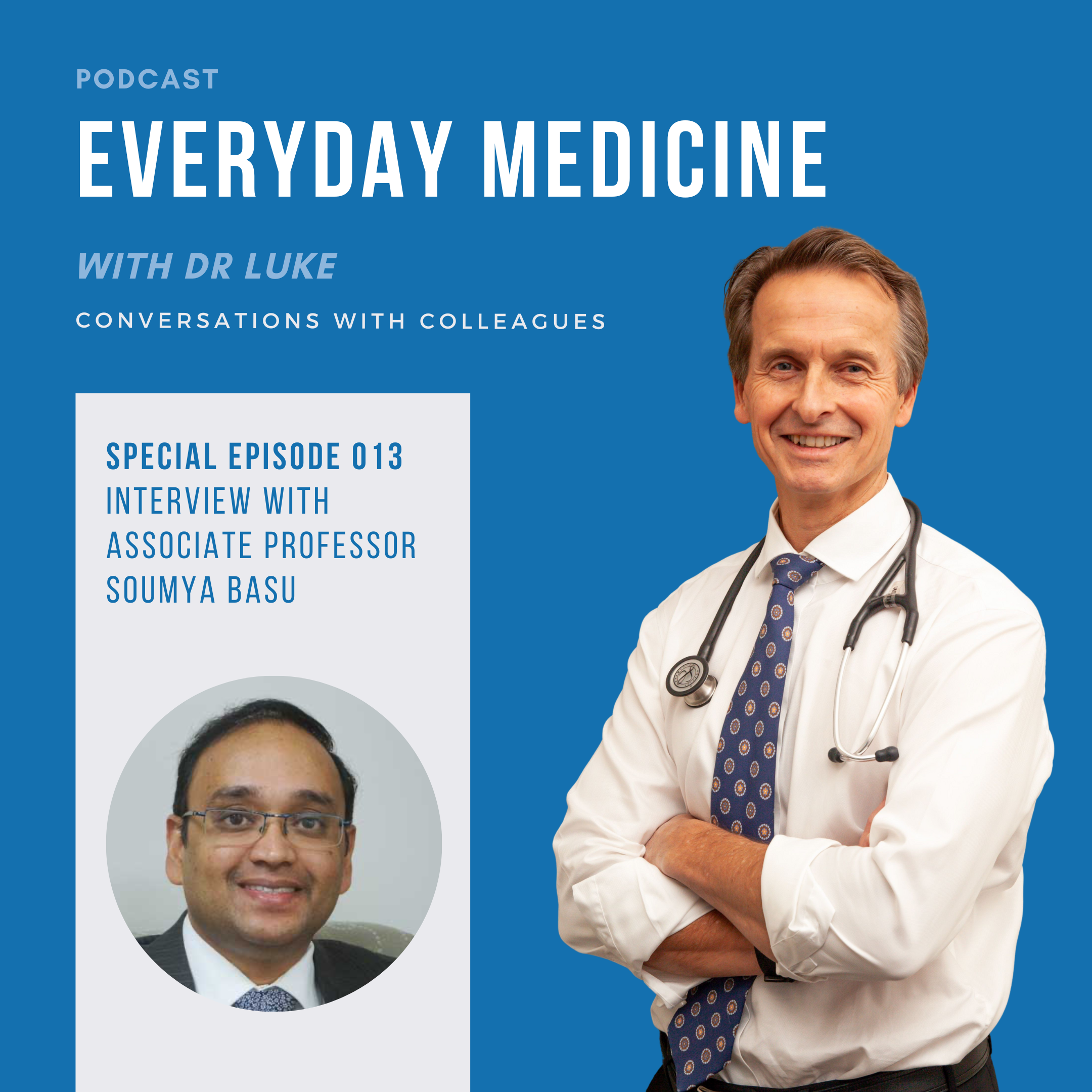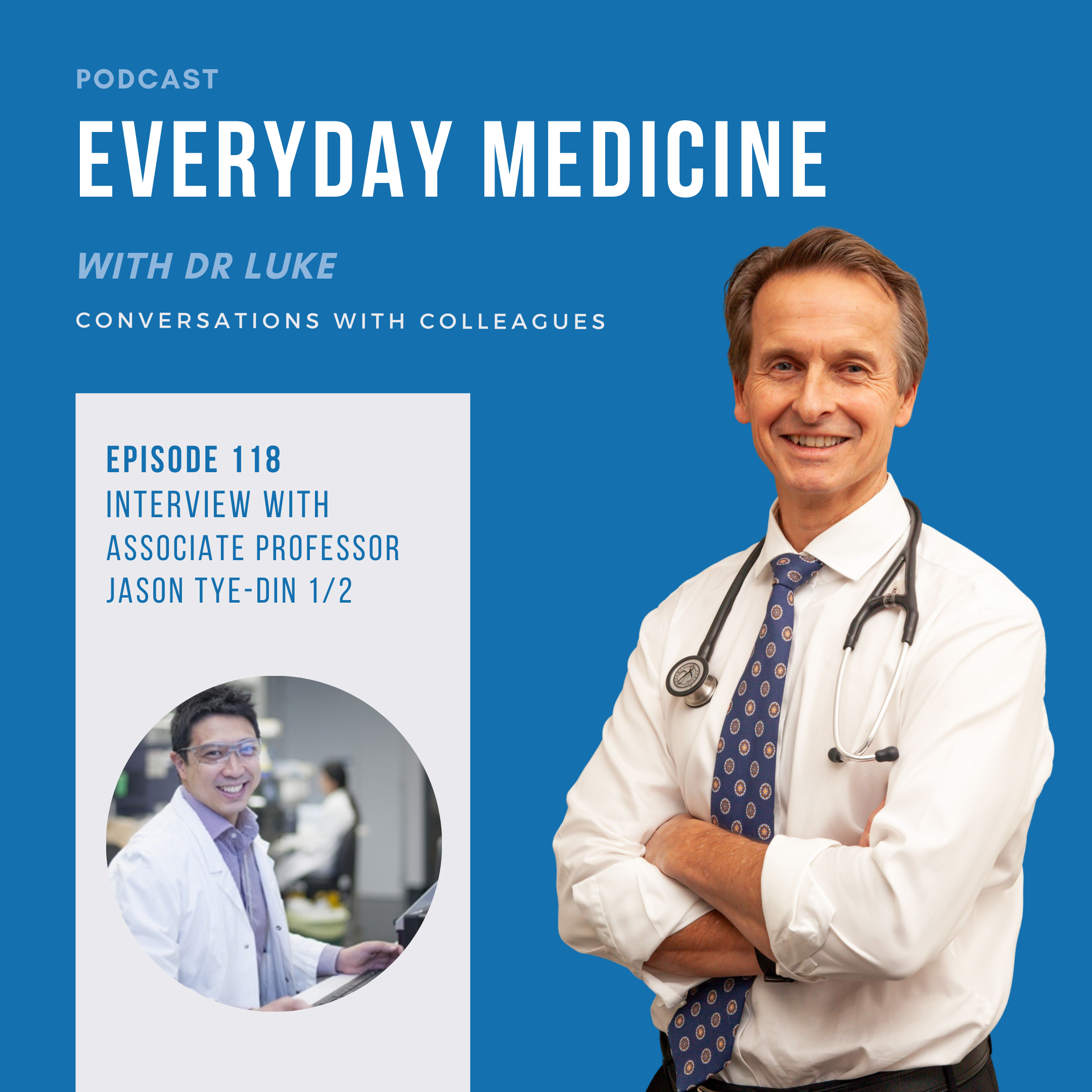Everyday Medicine by Dr Luke Crantock
Conversations with colleagues providing helpful ideas and advice in healthcare
Episode 135. Headaches with Dr Michael Eller
In my conversation with expert headache and movement disorder specialist Dr. Michael Eller from Richmond Neurology, I was keen to delve deeper into the realm of chronic primary headaches—specifically, migraine and cluster types. The evolving understanding of the pathophysiology of these headaches and the developing treatment approaches, focusing on inhibiting the neurotransmitter called Calcitonin gene-related peptide, is fascinating. This peptide is inhibited by the 5-HT1D and 1B receptor agonist effect of the triptans, as well as by a new family of CGRP-targeting drugs and monoclonal antibodies developed for the preventive treatment of migraine.
Episode 134. Health Impacts on Climate Change with Professor Richard
The World Health Organisation estimates that between 2030 and 2050, climate change is anticipated to result in approximately 250,000 additional deaths annually. These fatalities may arise from issues such as malnutrition, and heat stress, as well as diseases like malaria and infectious diarrhea. The impact of a planet warming at a recorded rate of 0.08 degrees centigrade per decade since 1880, accelerating to 0.18 degrees centigrade since 1981, poses threats to human lives and health across multiple dimensions. It's important to note that this statement does not delve into the detrimental potential such warming has on other species. Factors crucial to human survival—such as clean air, safe drinking water, a nutritious food supply, and secure shelter—are all imperilled in a world grappling with climate change. In this podcast, my intention was not to focus on the specific science of global warming and subsequent climate change, but rather on the associated health consequences.
Episode 133. Ehlers-Danlos and Hypermobility Syndromes with Associate Professor Chris O'Callaghan
Hypermobile joints were noted by Hippocrates as long ago as 400 BCE and are common, occurring in about 10-25 % of the population. In a minority of patients’ pain and injury results suggest that the clinical findings may reflect a condition referred to as hypermobility spectrum disorder, a polygenic connective tissue syndrome affecting between 1:500 to 1:600 people. This syndrome involves extreme joint flexibility often associated with joint pains, tends to run in families and is more common amongst females. Hypermobility spectrum disorder has been redefined separately from the more stringent diagnostic criteria required for the diagnosis of more extreme hypermobility syndromes such as Ehlers-Danlos syndrome, Marfans disease, Loeys-Dietz or Osteogenesis imperfecta syndromes.
Episode 132. Acid Base Balance with Associate Professor Adrian Regli (Part 2)
Acid-Base theory is often considered a difficult subject. As long ago as 1962, Creese et al wrote in the Lancet … “There is a bewildering variety of pseudoscientific jargon in medical writing on this subject “My suspicion is that some degree of confusion and thus avoidance of the subject continues to this day. Hopefully, this podcast conversation will resonate with some of our listeners and smooth out any misunderstandings should they exist.
Episode 131. Acid Base Balance with Associate Professor Adrian Regli (Part 1)
Acid-Base theory is often considered a difficult subject. As long ago as 1962, Creese et al wrote in the Lancet … “There is a bewildering variety of pseudoscientific jargon in medical writing on this subject “My suspicion is that some degree of confusion and thus avoidance of the subject continues to this day. Hopefully, this podcast conversation will resonate with some of our listeners and smooth out any misunderstandings should they exist.
Special Episode 15. Rheumatic Fever with Dr Alex Tai
Acute Rheumatic fever (ARF) is a multisystem disease caused by an immunological response to Group A streptococcal infection leading to Rheumatic heart disease (RHD) and is responsible for 250,000 deaths per year worldwide, predominantly in young people. It is estimated that 15 million people across the globe have evidence of Rheumatic heart disease. In Australia, the estimated incidence is reflective of ethnicity with 65 per 100 000 infections among Aboriginal and Torres Strait Islander people compared with 3 per 100 000 for other Australians. Consequently, 92% of the ARF reported is among Aboriginal and Torres Strait Islander people, mostly affecting children aged 5-14 years with rates of ARF and Rheumatic heart disease highest across northern and central Australia.
Episode 129. Epigenetics and Pancreatic Insulin Regeneration with Dr Ishant Khurana
Recently a team from the Monash Department of Diabetes published in the Nature Journal ‘ Signal Transduction and Targeted Therapy ‘ how their research could lead to the regeneration of insulin in pancreatic stem cells. As their findings could potentially benefit the 130,000 Type I diabetics in Australia and 30 per cent of Type II diabetics who are insulin dependent it received significant media attention. Diabetes is the fastest-growing illness in Australia and about 500 million people have diabetes worldwide with the potential complications of cardiovascular disease, renal failure, cerebrovascular disease, neuropathy, retinopathy, and lower limb amputation.
Associate Professor Neale Cohen who is the director of diabetes clinical research at the Baker Heart and diabetes institute believes the research shows great potential. Currently, the research is being conducted by a carefully selected team lead by Professor Sam El-Osta and including Dr Ishant Khurana and Dr Al-Hasani and we will be discussing their work and objectives further with Ishant in this podcast.
The research has discovered how to reawaken stem-like cells in the diabetic pancreas. Using an inhibitor of the protein called EZH2 which induces histone H3 lysine 27 trimethylation that functions to silence the insulin gene, insulin expression may be reawakened. If successful, the research will not only lead to a method for avoiding islet cell transplantation but possibly the need for exogenous insulin therapy altogether which is very exciting.
I was curious to have this research explained in more detail and to discover how close the investigative team were to success using these groundbreaking epigenetic strategies.
Please join me in welcoming Dr Ishant Khurana to the podcast.
References:
Dr Ishant Khurana: https ://research.monash.edu
Twitter: https://twitter.com/IshantKhuranaAU
Nature journal, Signal Transduction and Targeted Therapy titled: Inhibition of pancreatic EZH2 restores progenitor insulin in T1D donor. DOI: 10.1038/s41392-022-01034-7
Episode 128. Chronic Leukaemia with Jake Shortt
Leukemias are malignant progressive disease in which the bone marrow and other blood-forming organs produce increased numbers of immature or abnormal leucocytes. This is thought to occur after somatically acquired genetic mutations lead to dysregulation and clonal expansion of progenitor cells. Whilst most leukemias involve white blood cells, occasionally other cells are the primary leukemia cells such as red blood cells or platelets.
As disease progression occurs, suppression of normal blood cell production leads to anemia and cytopenia with a host of attendant symptoms and clinical consequences.
Episode 127. Acute Leukaemia with Jake Shortt
Leukemias are malignant progressive disease in which the bone marrow and other blood-forming organs produce increased numbers of immature or abnormal leucocytes. This is thought to occur after somatically acquired genetic mutations lead to dysregulation and clonal expansion of progenitor cells. Whilst most leukemias involve white blood cells, occasionally other cells are the primary leukemia cells such as red blood cells or platelets.
As disease progression occurs, suppression of normal blood cell production leads to anemia and cytopenia with a host of attendant symptoms and clinical consequences.
There are 14 new diagnoses of Leukaemia per day in Australia accounting for about 5200 diagnoses yearly and making up about 3.2 % of all new cancer diagnoses per year. Leukaemia is responsible for over 2100 deaths annually. Men are slightly more likely to be affected in a 60: 40 split with women. By the age of 85 years, one has a 1: 50 chance of this diagnosis. With current treatment approaches overall 5-year survival sits at about 64 % but this figure is influenced by the subtype of Leukaemia diagnosed with aggressive forms of Leukaemia such as AML carrying a much worse prognosis than a diagnosis such as CLL which may run an indolent course for many years.
Dividing adult Leukaemia into acute and chronic classification is most helpful and this podcast will approach the topic similarly over two episodes.
The acute Leukaemias encompass acute myeloid leukemia (30 % of adult Leukaemia), acute lymphoblastic Leukaemia and Leukaemia's of ambiguous origin.
The chronic Leukaemias include Chronic Myeloid Leukaemia (CML) and Chronic lymphocytic leukemia (CLL)
This is another vast subject, and it was a real honour to invite Professor Jake Shortt to the podcast. Jake is the Head of Haematology Research at the School of Clinical Sciences and clinical lead at Monash Haematology for Myeloid Leukaemia, myelodysplasia and T-cell lymphoma. He is the Principal Investigator on a range of clinical trials for T-cell lymphoma and myeloid malignancies, conducted through the Monash Haematology clinical trials unit and the recipient of a Medical Research Future Fund Career Development Fellowship. His work in the School of Clinical Sciences is focused on strategies incorporating epigenetic drugs with immunotherapy in haematological cancers, particularly Lymphoma and Multiple Myeloma. Jake heads the Blood Cancer Therapeutics laboratory within the Monash Health Translation Precinct and somehow also finds the time to be Chair of the Laboratory Sciences Working Party of the Australasian Leukaemia and Lymphoma Group (ALLG) and Deputy Chair of their Scientific Advisory Committee.
Please welcome Professor Jake Shortt to the podcast.
References :
Haematology and Oncology Subspecialty Consult, 4th Ed, Cashen and Van Tine, Wolters Kluwer, Ch 31
www.leukaemia.org.au
www.cancer.org.au
www.monashhealth.org/services/haematology/jake-shortt/
Episode 124. Lipids and Atherosclerotic Cardiovascular Disease with Dr Brett Forge (Part 3/3)
Lipids are essential for cell function and healthy metabolism however clinical analysis of a patient’s lipid profile also addresses one of the fundamental drivers of atherosclerotic cardiovascular disease responsible for 25 % of all deaths in Australia. Modification of abnormal serum lipid levels by lifestyle and pharmacologic intervention aims to achieve a healthy coronary circulation reducing new atheroma formation and stabilizing preexisting atheromatous plaques.




















